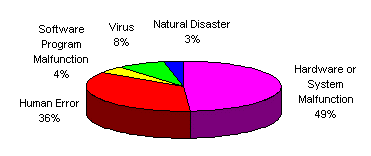[ The PC Guide | Systems and Components Reference Guide | Hard Disk Drives | Hard Disk Performance, Quality and Reliability | Hard Disk Quality and Reliability | Hard Disk Warranty and Disaster Recovery Issues ]
Data Recovery
Hard disks differ from virtually every other component in the PC in one very critical respect: when you lose a hard disk you lose more than just hardware--you lose software and data as well. The hard disk can be replaced, but the data on it often cannot (and it certainly isn't covered by your warranty). This is why annoying people like me always harp on users to back up their data.
If for some reason you fail to heed my sage advice :^) and do not back up your important data, it is still sometimes possible to recover it in the event of a hard disk failure. There are data recovery services that specialize in restoring lost data from hard disks that have either failed or been corrupted due to software problems (accidental formatting, viruses, etc.)
Some of these services are pretty amazing--many of them have a very good success rate and can resurrect data even when it seems like it would be impossible to the casual observer. They use specialized equipment and software, and typically even have mini clean rooms that enable them to take the cover off the drive and access the platters directly. All this wizardry comes at a cost, of course. A full recovery usually starts at a few hundred dollars and proceeds from there. The cost is high for three reasons: the equipment is expensive, the people are highly skilled, and the company knows how valuable the data is or you wouldn't be talking to them. Compared to recreating a year's worth of data, $2,000 for a recovery is a bargain. Compared to doing routine backups, it's a colossal waste of money.
One company well-known for performing data recovery is Ontrack.
|
This graph shows the most common causes of data loss |
![]() Note: The use of RAID arrays will reduce the likelihood that data recovery
will be required, but can complicate matters if for some reason it is required.
For information on the implications of RAID on data recovery, see this section.
Note: The use of RAID arrays will reduce the likelihood that data recovery
will be required, but can complicate matters if for some reason it is required.
For information on the implications of RAID on data recovery, see this section.
![]() Note: Even though drives
have labels and stickers on them saying that if the drive is opened the warranty will be
voided, this does not apply to professional data recovery. These companies have
arrangements with the major hard disk manufacturers to allow them to work on the drives
without affecting the drive's warranty status. In some cases the recovery company may be
required to send a letter to the drive manufacturer certifying that your particular drive
had recovery performed upon it.
Note: Even though drives
have labels and stickers on them saying that if the drive is opened the warranty will be
voided, this does not apply to professional data recovery. These companies have
arrangements with the major hard disk manufacturers to allow them to work on the drives
without affecting the drive's warranty status. In some cases the recovery company may be
required to send a letter to the drive manufacturer certifying that your particular drive
had recovery performed upon it.
![]() Next: Redundant
Arrays of Inexpensive Disks (RAID)
Next: Redundant
Arrays of Inexpensive Disks (RAID)
| The PC Guide
(http://www.PCGuide.com) Site Version: 2.2.0 - Version Date: April 17, 2001 © Copyright 1997-2004 Charles M. Kozierok. All Rights Reserved. |
Not responsible for any loss resulting from the use of this site. Please read the Site Guide before using this material. |
